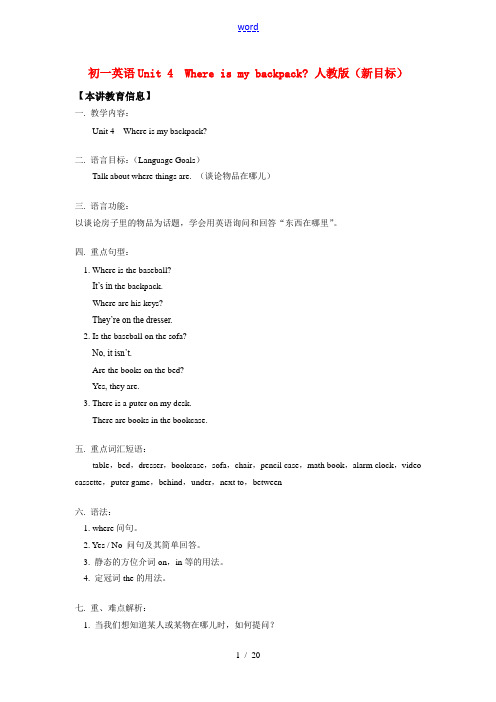七年级英语下册Unit4重点短语概括复习人教新目标版PPT课件
七年级英语下册第四单元重点短语及句型汇总

七年级英语下册第四单元重点短语及句型汇总七年级英语下册第四单元重点短语及句型汇总Unit4Don’teatinclass知识点一.重点短语1.schoolrules学校规章制度2.break(fallow/keep)therules违反(遵守)规章制度3.arrivelateforclass=belateforclass上课迟到4.dininghall饭厅,餐厅5.inclass在课堂上6.ontime准时(intime及时)7.listentomusic听音乐8.wearschooluniforms穿校服9.Isee我明白了10.be(keep)quiet保持安静11.accordingto根据,依据12.make(up)ruler制订规则13.share(sth.)withsb.和某人分享(…)14.onschooldays在上学期间15.onschoolnights在校期间的晚上16.practice(playing)thepiano练习弹钢琴practicedoing…练习做…]17.goout外出18.clean(one’s)room打扫房间19.dothedishes洗餐具20.toomany/much太多的(可数/不可数)21.gotobed去睡觉(beinbed在床上)22.bestrict(withsb.)对某人要求严格23.Don’ttalk.=Notalking.不要说话24.followrules遵守规则二.用法集萃1.Don’t+动词原形+其他,不要做某事。
2.helpsb.(to)dosth.帮助某人做某事3.toomany+可数名词复数太多的……4.toomuch+不可数名词太多的5.practicedoingsth.练习做某事6.bestrictwithsb.对某人要求严格7.bestrictinsth.对某事要要求严格8.keep+宾语+形容词使……保持某种状态9.learntodosth.学会做某事10.havetodosth.不得不做某事11.leavesthsp.把某物忘在某地三.重点句型1.Don’tarrivelateforclass.Youmustbeontime.上课不要迟到。
unit 4【复习课件】七年级英语下册单元复习(人教版)

10. I can’t relax on weekends __e_it_h_e_r___ _b_e_c_a_u_se___ I have to
learn to play the piano. 周末我也不能放松, 因为我不得不去学习弹钢琴。
重点语法
祈使句
用于表达命令、请求、劝告、警告、禁止等的句子称为 祈使句。祈使句最常用于表达命令。祈使句因对象(即主语) 是第二人称, 所以通常省略主语而以动词原形开头。祈使句句 末使用句号或感叹号。为表示语气委婉, 可在句首或句尾加 please, please放在句尾时, 前面通常加逗号。
Let me help you. 让我来帮你。
重点语法
祈使句
考题:[ 广元] —________ silent, please! You are in the library.
—I’m sorry, madam.
A. Keep
B. To keep
C. Keeping
D. Kept
重点语法
祈使句
否定祈使句的形式:
重点单词
1. rule n. 规则; 规章→____s_c_h_o_o_l_r_u_le_s___学校规则 2. arrive v. 到达→ ___a_r_r_iv_e__in_/_a_t._..__到达……
→ar_r_i_v_e_l_a_te__fo_r__sc_h上oo学l 迟到 3. fight v.& n. 打架; 战斗→ __f_ig_h__t _a_g_a_in_s_t_s_b_.和某人打斗→
→_____fo_l_lo_w__in_g____n. 下列事物
重点单词
30. learn v. 学习; 学会→ _le_a_r_n__to__d_o_s_t_h_.____学习做某事 → ____l_ea_r_n__fr_o_m__s_b_.向某人学习 → ____l_e_a_rn__a_b_o_u_t了解; 获悉
人教版七下英语unit4语法知识点

人教版七下英语unit4语法知识
点
wear v.穿着:戴着(状态)接衣帽、饰物等 wear a
skirt/hat/watch wear masks戴口罩 wear a smile面带微笑put on穿上;戴上(动作) Put on your sweater!穿上你的毛衣!
Section A
important adj.重要的 it s important for sb.to do sth.做某事对某人来说是重要的 It's very important for us to wear masks now.现在戴口罩对我们来说是非常重要的。
importance n.重要性 the importance of health健康的重
要性
quiet adj.形容词安静的(修饰n.或放be/系动词后)
quite adv.副词很,非常(相当于very) be quiet/keep quiet/stay保持安静 We have to be/keep quiet in the library.在图书馆里我们必须保持安静
情态动词must表示“必须;务必用法:主语+must+动词原形+其他例句:You must wear the school uniform at school。
七下英语第四单元知识点归纳

七下英语第四单元知识点归纳English:In the fourth unit of seventh grade English, students learn about different ways to express future events, such as using will, going to, and present continuous. They also study vocabulary related to school subjects, school events, and future careers. Additionally, students learn how to make predictions using modal verbs like may, might, and could. In terms of grammar, students are introduced to the concept of countable and uncountable nouns, as well as how to use some and any correctly. They also practice using imperatives, such as giving advice or making suggestions. Lastly, students explore the theme of future aspirations and goals, discussing what they hope to achieve in the future and how they plan to make their dreams a reality.中文翻译:在七年级英语的第四单元中,学生学习了表达未来事件的不同方式,例如使用will、going to和现在进行时。
Unit4复习课件英语七年级下册

turn on open
打开;接通(电源等) 打开;敞开
通常指打开水龙头、电灯、 电视等电器开关,其对应 的短语是turn off
通常指把关着或封闭的门 窗、箱子、盒子等打开, 其对应词是close
Open the door and turn on all the lights 打开门,并打开所有的灯。
good things people enjoy in life.
16.感恩节晚餐的主菜几乎通常是火鸡。 The main dish of Thanksgiving dinner is almost always turkey.
1.Cut up 切碎 “动词+副词”型短语,名词作宾语时,置于副词前后均可, 如cut up a tomato ;cut a tomato up 但代词要置于动词和副词之间并且用宾格,如:cut it up cut them up 拓展:
1.Please put two teaspoons of salt into the water , and then _______. A mix up it B mix it up C mix up them 2.Don’t mix ______ until I pour the milk ______ the blender. A.up them; into B them up; into C up them ; in 3.The apple is too big. You can ______ first. A. mix it up B. cut it up C. cut up it 4.Don’t _____ so often. It’s bad for your health. A.get up B stay up C look up
人教版七年级下册英语第四单元课件

拓展
情态动词can的用法
用于疑问句中用来提出要求。例如: Can you...?“请你……好吗?”表示说话 人的请求。 Can I...?“我可以……吗?”用来征求对 方是否允许自己做某事。如在句末加上 please一词就显得更有礼貌了。例如:
Can you help me, please? 请你帮助我好吗?
• 他每天准时到校。
• He gets to school on time everyday
• 她及时赶到了医院。
• She reach the hospital in time. • be sitnrsiicdte with里s面b.的;在里部的
• 他爸爸对他很严格。
• His father is strict with him.
1. 表示能力(如体力和脑力方面),意为 2. “能;会”等。例如:
Can you speak English? 你会讲英语吗?
2. 表示请求或允许,多用在口语中,意为“可以; 能”等。例如: Can I help you? 我能帮助你吗? 用于否定句表示不允许。例如: You can’t play basketball. 你不能玩篮球。
have to + 动词原形 + …?
What do you have to do?
Where does she have to go? 2.have to 与must的区别
have to 着重于客观的需要,含有不得不的客观强 制性; must着重于主观上自己认为有义务,有必要 .She has to clean the classroom every week. I must go now. 在否定句中,don’t have to 表示没有必要, Mustn’t表示禁止.
Unit 3--4 课件人教新目标七年级英语下册单元基础知识复习

重点短语
根据汉语意思,写出相应的英文短语 1. 坐火车 _ta_k_e__th_e__t_ra_i_n_/b_y__t_ra_i_n_ 2. 坐公交车 _t_a_k_e_t_h_e__b_u_s_/b_y__b_u_s__ 3. 坐地铁 _ta_k_e__th_e__s_u_b_w__a_y_/b_y__s_u_b_w_a_y__ 4. 骑自行车__r_id_e__a_b__ik_e_/_b_y_b_i_k_e__ 5. 每天_____e_v_e_ry__d_a_y____ 6. 到校____g_e_t _to__s_c_h_o_o_l__
5.Lily is ___n_e_w___ (新的)in our class. Let's tell her some of our class rules. 6.There is a lake in the center of the park and we can take a ___b_o_a_t__ (船) there. 7.Some of them take the _s_u_b__w_a_y_ (地铁) to school. 8.My grandpa likes to ___l_iv_e___ (居住) in the village. He doesn't want to move to the city. 9.The old man is 90 __y_e_a_r_s__ (岁) old, but he can walk well and speak clearly. 10.Don't __l_e_a_v_e__ (离开) the club before four o'clock in the afternoon.
17.开车(v.) ___d_r_iv_e__ →(名词)司机 __d_r_iv_e_r__ 18.横过;越过(v.)___c_ro_s_s__ →(介词)__a_c_r_o_s_s_ 19.离开;留下(v.)___le_a_v_e__ →(过去式)___l_e_f_t __ 20.真的;符合事实的(adj.)___t_ru_e___ →(副词)___t_ru_l_y__ →(名词)___tr_u_t_h__
人教版七年级英语下册Unit4复习课件

—Do my homework, of course.
A. What
B. When
C. Where D. How
4. —
late for school again.
—Sorry, I won’t.
A. Not be B. Don’t be C. Not D. Don’t
5. Which of the following pictures means“Please be quiet”?
【用法辨析】listen与hear的区别
【活学活用】
Байду номын сангаас
①听! 你能听见汤姆正在唱歌吗?
! Can you
Tom singing now?
②不要在会上听收音机。
Don’t
the radio in the meeting.
答案: ①Listen; hear ②listen to
4. We can’t wear a hat in our school. 在我们学校里不允许戴帽子。 【自主领悟】wear“穿; 戴”, 表示状态。相当于be in。例如: He is wearing a black T-shirt. 他穿着一件黑色的T恤衫。
【归纳拓展】before的其他用法
【活学活用】
①She always says goodbye to her mother before
(go)to school.
②He always washes his feet
he goes to bed.
A. after
B. because
C. if
D. before
his workers and he is
also strict
人教版七年级下册英语Unit4短语句子默写课件

2d 默写
1.我叫约翰。今天是我来校的第一天 2.嗨,约翰 我是艾丽斯。这是一所很棒的学校,但有很多校规 3.真的吗?有些什么校规呢? 4. 上课不许迟到,这点十分重要 5.好吧 所以我们必须守时。我们可以把音乐播放器带到学校吗 6.不,不可以的。并且我们总是穿校服(上学) 7.我知道了 8. 奥,我们还必须在图书管保持安静。
Can we wear a hat in class? Yes, we can./No, we can’t.
Does he have to wear a uniform at school? What do you have to do?
Yes, he does./No, he doesn’t. We have to be quiet in the library.
在音乐教室 在外面听音乐 在教室吃东西 在餐厅里吃东西 在外面吃 戴帽子
2a-2b
in the music room listen to music outside eat in the classroom eat in the dining hall eat outside wear a hat
1.太多规则 2整理你的床铺 3.在厨房 4.有更多规则 5.不要吵闹 6.不能放松 7. 读书 8.要求严格 9.制定规则来帮助我们 10 遵守规则 11.好运气 12.对某人要求严格 13 .对某事要求严格 14. 考虑
Section B 2b 课文
too many rules make your bed in the kitchen have more rules don’t be noisy can’t relax read a book be strict make rules to help us follow the rules good luck be strict with sb. be strct in sth. think about
七年级英语下册Unit4Don’teatinclass单词短语及重点句型新版人教新目标版_297

Unit 4 重点短语及句型背诵(留存备用考前复习)Key Phrases重点短语1.in class 在课堂上2.be/arrive late for 迟到3.in the hallways 在走廊里4.in the classroom 在教室里5.listen to (music) 听(音乐)6.in the dining hall 在餐厅里7.be on time 准时 8.a lot of rules 许多规则9.some of... 一些...... 10.bring...to... 把.....带来....11.have to 不得不 12.keep/be quiet 保持安静13.wear the school uniform 穿校服 14.wear a hat 戴帽子15.go out 外出(娱乐) 16.do the dishes 清洗餐具17.on school nights/days 在上学日的晚上/在上学日18.every morning 每天早上 19.too many rules 太多规则20.make(one's) bed 铺床 21.think about 考虑22.be strict(with sb.) (对某人)要求严格 23.follow the rules 遵守规则Key Sentences 重点句型1.Don't be/arrive late for class. You must be on time.上课不要迟到。
你必须按时到。
2.It's my first day at school.这是我在学校的第一天。
3.What are some of the rules? 其中的一些规则是什么呢?4.Can we bring music players to school? 我们可以把音乐播放器带到学校来吗?5.And we always have to wear the school uniform.我们总是得穿校服。
人教新目标中考一轮复习七年级下册unit3-4重点单词短语

七下3-4unit 31. train n.火车——training n.训练——trained adj.训练过的——trainee adj.新兵;练习生——trainer n.教员;运动鞋(trainers)2. ride vt.&vi.乘;骑——rider n.骑手——riding vt.&vi.乘;骑(现在分词)——rode vt.&vi. 乘;骑(过去式)——ridden vt.&vi.乘;骑(过去分词)3. bike n.自行车——biker n.骑自行车的人4. far adv.远的——farther adv.更远;further(抽象意义)adv.更远——farthest adv.最远;furthest(抽象意义)5. new adj.新的——newly adv.新近——newest adj.最新的——newer adj.更新的6. drive v.驾驶——driver n.驾驶员——driven adj.奋发图强的&v.骑(过去分词)——driving n. 操纵,驾驶&v.驾驶(现在分词)7. live v.生存——life n.生活——lively adj.充满活力的——alive adj.活着的;活泼的——living adj.活着的;生动的8. cross n.十字架——crossed adj.十字的,交叉的——crossing n.人行横道——across prep.&adv.穿过;横穿9. many adj.许多——much adj.许多(不可数)——more adj.更多的——most adj.最多10. village n.村庄——villager n.村民11. year n.年——yearly adj.每年的12. likev.喜欢——likely adj.可能的——dislike v.不喜欢——unlike prep.不像——unlikely adj.不大可能的;难以置信的13. leave v.离开——left adj.剩下的——leaver n.离开者14. dream vi.梦想;做梦&n.梦——dreamy adj.如梦的——dreamily adv.梦幻般地——dreamer n. 做梦的人15. true adj.真正的——truly adv.真正——truth n.真理;真相——truthful adj.说实话的——truthless adj.不忠实的——truthfulness n.诚实Unit41. rule n.规则——ruler n.统治者&直尺2. arrive vi.到达——arrival n.到达3. listen vi.倾听——listener n.听众4. fight vt.&vi.战斗——fighting adj.战斗的——fighter n.战士5. outside adv.&adj.在外面——outsider n.局外人——outsides n.外部;外表——inside adj.里面的6. wear vt.穿着——wearable adj.可穿用的——worn adj.穿破的;用坏的7. important adj.重要的——importance n.重要性——importantly adv.重要地8. uniform n.制服——uniformed adj.穿制服的9. quiet adj.清净的——quietly adv.平静地——quietness n.安静——quieten vi.&vt.使安静10. out adv.在外;完全;出局——outer adj.外面的——outing n.远足;短途旅游;体育比赛11. practice n.练习——practical adj.实践的——practically adv.实际上——impractical adj.不切实际的12. more adv.更——much adj.很多(不可数)——many adj.很多(可数)——most adj.最多13. noisy adj.嘈杂的——noise n.噪音——noisily adv.嘈杂地14. relax vi.&vt.使轻松——relaxing adj.轻松的——relaxed adj.感到放松的——relaxation n. 放松15. read vt.&vi.阅读——reader n.读者——reading n.阅读16. terrible adj.糟糕的——terribly adv.非常;糟糕地——terribleness n.可怕17. feelv.——feeling n.感觉(可数)18. strict adj.严格的——strictly adv.严格地——strictness——n.严格——stricter adj.更严格的——strictest adj.最严格的19. remember vt.&vi 记忆——remembrance n.记忆力20. follow vt.&vi——following adj.后面的——follower n.跟随者21. luck n. 幸运——lucky adj.幸运的——luckily adv.幸运地——unluckily adv.不幸地22. keep v.保持——keeper n.保管者;饲养员23, hair n.头发——hairy adj.多毛的24.learn vt.&vi 学习——learning n.学问,学术——learner n.学习者Unit 3一、重点短语1. ride a bike 骑自行车2. take the subway/train/plane/bus to sp=go to sp bysubway/train/plane/bus乘坐地铁/火车/飞机/公交车去..go to sp on a subway /train/plane/bus3.take a car/boat/taxi to sp = go to sp by car/boat/taxi 乘坐小车/船/出租车去..go to sp in a car/boat/taxi4.fly /drive/ride to sp 坐飞机/开车/骑车去...5. walk to sp =go to sp on foot 走路去..6. It takes sb. some time to do sth. 花某人多长时间做某事It为形式主语,to do不定式为真正主语7. live in 居住在....live with sb 和某人一起住8.two hundred students 两百个学生注:前面有基数词时,hundred无复数hundred s of students 成百上千的学生无具体数字时,hundred 加s,需加of9.thanks for doing sth 谢谢做某事10.an 11-year-old boy 一个11岁大的男孩注:有连字符时,中间名词必须用单数11.think of 认为what do you think of/about sth?=How do you like sth?你认为..怎么样?12.cross =go/walk/run cross 从...表面通过13.go on a ropeway 坐索道14.between...and... 在...和..之间15.be afraid of ...害怕...be afraid of doing sth be afraid to do sth 害怕做某事16.be like/look like 像.../ 看起来像... 注: like表示“像”时为介词,无三单17.leave home 离开家leave (sp ) fo r sp (离开某地)前往某地e true实现,变成现实注true的书写,come true 主语为梦想,理想等19.far(away)from 离...远二、重点句型1、How do you get to school? 你怎样到达学校?I ride my bike. 我骑自行车。
人教版七年级下册Unit 4-Unit 6【复习课件】中考英语一轮大单元复习(人教版)

6.——你为什么喜欢狗? ——因为它们挺有趣的。 —Why do you like dogs ? — Because they're kind of interesting .
7.我喜欢狗因为它们既友好又聪明。 like dogs because they're friendly and smart . 8.大象是泰国的一种象征。 The elephant is one of Thailand's symbols .
上一页 返回导航 下一页
2.save vv..节 储省 存; ;省 储去 蓄 v.救;救助 例:Please save water.请节约用水。(v.) He managed to save enough money to buy a small house.他想办 法攒了足够的钱买了座小房子。(v.) She saved a little girl from the fire.她从火中救了一个小女孩。 (v.)
上一页 返回导航 下一页
4.luck(n.)→ lucky (adj.)运气好的;侥幸的★ → luckily (adv.)幸运地;好运地 → unluckily (adv.)不幸地★ ▲bring good luck to … 给……带来好运 5.south(n.)→ southern (adj.)南方的;南部的★ 6.forget(v.)→ forgot (过去式)★ → forgotten (过去分词)忘记;遗忘;忘掉 → forgetful (adj.)健忘的★
上一页 返回导航 下一页
7.feel(v.)→ felt (过去式/过去分词)摸;触;感觉;觉得;摸起 来★ → feeling (n.)感觉;感情★ ▲feel like doing sth.想要做某事 8.noise(n.)→ noisy (adj.)吵闹的★ ▲make a noise 制造噪音 9.danger(n.)→ dangerous (adj.)危险的★ ▲be in (great) danger 处于(极大)危险之中
七年级英语Unit 4Where is my backpack 人教版(新目标)知识精讲

初一英语Unit 4 Where is my backpack? 人教版(新目标)【本讲教育信息】一. 教学内容:Unit 4 Where is my backpack?二. 语言目标:(Language Goals)Talk about where things are. (谈论物品在哪儿)三. 语言功能:以谈论房子里的物品为话题,学会用英语询问和回答“东西在哪里”。
四. 重点句型:1. Where is the baseball?It’s in the backpack.Where are his keys?They’re on the dresser.2. Is the baseball on the sofa?No, it isn’t.Are the books on the bed?Yes, they are.3. There is a puter on my desk.There are books in the bookcase.五. 重点词汇短语:table,bed,dresser,bookcase,sofa,chair,pencil case,math book,alarm clock,video cassette,puter game,behind,under,next to,between六. 语法:1. where问句。
2. Yes / No 问句及其简单回答。
3. 静态的方位介词on,in等的用法。
4. 定冠词the的用法。
七. 重、难点解析:1. 当我们想知道某人或某物在哪儿时,如何提问?Where is / are + … ?当我们想知道某个物品在哪儿时,我们通常用Where is / are … ?句型来提问。
如:Where is my backpack?△where 是疑问副词,意思是在哪里,后面用一般疑问句句型。
△当询问的物品数量为单数时,其前的be 动词应使用is ,因为该物品在问句中提到过,所以回答时用代词it 代替该物品。
人教版七年级英语下册 Unit4总复习课件

have to 必须,不得不 don’t / doesn’t have to 不必
你不必在上午七点前到校。 You don’t have to be school before 7:00.
考点7
祈使句
1.祈使句是表示命令、叮嘱、号召等的句子; 2.通常省略主语you; 3.句中谓语动词用动词原形; 4.祈使句有肯定和否定两种:
否定
Don’t eat in class. Don’t play sports in the classroom. Don’t fight.
肯定
Come in, please! 请进! Sit down, please. 请坐。
违规 break rules
3.考点归纳
考点1
arrive in / at与get to 的区别
① My father arrived in / got to Beijing this morning.
我爸爸今天上午到达了北京。
② The farmer arrived at / got to an old house and knocked at
(be) on time be late for … in class listen to … dining hall eat outside bring … to … have to wear the school uniform go out see friends practice the guitar
26.遵循;跟随v.
follow
27.幸运;运气n.
Unit4GrammarFocus3c课件人教版英语七年级下册

We can eat in the classroom …
We don't have to wear school uniforms…
We can listen to music in the classroom …
询问规则
Can we eat in the
No, we can’t, but we can
classroom?
eat in the dining hall.
情态动词can的一
般疑问句及其答句
Can we wear a hat in class? Yes, we can. / No, we can’t.
重点① Don’t…祈使句的运用。 重点② 情态动词can,have to,must的使用。
一、语法点单句特训。 ( A )1.—Mike, remember to OK, Mr.Chen.
your homework to school. —
A.bring
B.take
C.carry
D.do
( C )2.Don’t
must 其他用法 must: 表示猜测,“一定;必然”
You must be hungry.
3a
1 2
Write the rules for the school library.
Tip: Try to use No+N/Doing.
Library Rules
Don’t talk.
1._N__o_t_a_l_k_in_g_/_B_e__q_u_ie_t_._______
新人教版七年级下册unit4重点单词 短语 语法分析

Unit4【重点单词】1.rule 规则、规章2.hall 大厅、礼堂3.listen 听,倾听4.sorry 抱歉的,难过的,惋惜的5.wear 穿,戴6.bring 带来、取来7.quiet 安静的8.practice 练习9.before 在…..以前10.kitchen 厨房11.noisy 吵闹的12.read 读,阅读13.feel 感觉;觉得14.remember 记住,记起15.keep 保持保留16.learn 学习学会17.arrive 到达18.dining 餐厅19.fight 打架,战斗20.outside 在外面21.important 重要的22.uniform 校服、制服23.out 外出24.dish 碟子盘子25.dirty 脏的26.more 更多的27.relax 放松休息28.terrible 非常讨厌的可怕的29.strict 严格的严厉的30.Follow 遵循,跟随31.Hair 头发,毛发*【重点短语】Listen to 听…..be late for class 上课迟到do the dishes 清洗餐具every day 每天in class 课堂上too many rules 太多规则go out 外出(娱乐)dining hall 餐厅have to 不得不be strict(with sb.)(对某人)要求严格(be)on time 准时after school 放学后follow the rules 遵守规则at school 在学校在上课*【日常用语归纳】1.向对方询问规章制度,看自己能否做某事Can we wear hates?What are the rules at your school?What else do you have to do?2、表示许可或不允许做某事You can’t eat in the classroom.We can eat in the cafeteria.We don’t have to wear a school uniform.Don’t eat in class.*【语法】1、祈使句Don’t……2、Can用于表示请求Can I/we…..?3、情态动词must和have to的用法*【语言知识精讲】:【Class 】班级,一节课,全班同学Class用作名词。
七年级Unit 4(单元解读课件)-七年级英语下册同步备课系列(人教版)

学习理解 应用实践
学习理解 应用实践
迁移创新
课时内容解读
第四章
PART FOUR
单元内容解读
主题词汇
rule, dish, night, luck, hair, arrive, listen,fight, wear, bring, practice, relax, read,feel, remember, follow, keep, learn, quiet,noisy, dirty, terrible, strict
2d所提供的对话呈现老生与新生谈论关于学校的校 该 语 篇 的 语 词汇:
在看图和
规的对话,包括了上课不迟到,不带吉他去学校,穿 法 功 能 性 比 wear,immportant , 听对话的
校服以及在图书馆保持安静。
较 强 , 能 为 bring ,uniform , 过程中,
grammar focus表格呈现了单元重点语法功能结构, 学 生 学 习 语 quiet
学习理解 应用实践
1. 学生能够用do型祈使句表达规则 2.学生能掌握用can的肯定句,否定句和一般疑问 句表达规则。 3. 学生能学会遵守学校规则
学习理解 应用实践
统筹课时安排
教材板块
课型
第*课时
课时目标
学习层次
第三节 SectionB
1a-1f
第四节 SectionB
2a-2c
第五节 SectionB 3a-self
能简单谈论规章制度
主题群:做人与做事,人际沟通
子主题内容:班级与学校规则,规
则意识
单元内容解读
01 What:该单元语篇内容主要是中学生的学习和生活上的规章制度
Why:引导学生关注规则,养成遵守规则的习惯和意识。训练学生遇到规则问题
Unit4 单元知识点总结课件--七年级英语下册(人教版)

No+ 动词-ing 禁止做某事
No smoking.
Let sb not do sth
让…不要做某事
Let them not go.
相关链接: Let’s+动词原形 Vs. Let us+动词原形
Let us+动词原形:通常不包括听话者在内;省略主语you Let us watch TV. (“你让我们”;说话者和听话者不一起)
2.___________exercising, and you’ll be healthier.
A.Keep
B.To keep
3.Jack, ___________here, and I will give you a present.
A.comes
B.come
4. _____ quiet, please. We are in the reading room.
have to
强调客观需要 有人称/时态变化 It’s too late. We have to go home now.
单项选择
1.——Hey, Ted! You ___________never play in the street. It’s not safe.
——Sorry, Mum. I won’t again.
—— OK! I’ll be there soon.
A.fetch
B.take
C.bring
3.It’s cold outside. You should ___________a coat with you.
A.bring
B.take
C.get
4.—— I’m sorry I left my homework at home. Must I go and ___________it?
七年级英语下册 Unit 4 Don’t eat in class短语、语法知识点汇总 (新版)人教新目标版

Unit 4 Don’t eat in class 一、基础归纳【教材内容解析】Section A1.Don’t arrive late for class. (P. 19)arrive作不及物动词,表示“到达”,接宾语时,需要加上介词in或者at。
When did you arrive?We are arriving at the station at two o’clock.【拓展】reach表示“到达”时,是及物动词,后面直接接表示地点的名词作宾语。
另外两个表示“到达”的动词(get和arrive)都是不及物动词,get to+地点;arrive in/at+地点。
After a long way, they reached/got to/arrived at the top of the mountain finally.2.You must be on time. (P. 19)on time用作固定短语,表示“准时、按时”,in time表示“及时”。
The train arrives on time.The ambulance(救护车) arrives in time.3.Don’t listen to music in class. (P. 19)listen用作不及物动词,表示听的动作,后接宾语时,需要加上介词to,hear强调听的结果,表示“听到”。
This girl likes to listen to music.Can you hear anything?4.Don’t fight. (P. 19)fight此处用作动词,意为“打架”,fight with sb.意为“与某人打架”。
Why do you sometimes fight with others?5.listen to music outside (P. 20)outside表示“在外边”,反义词为inside“在……里面”。
- 1、下载文档前请自行甄别文档内容的完整性,平台不提供额外的编辑、内容补充、找答案等附加服务。
- 2、"仅部分预览"的文档,不可在线预览部分如存在完整性等问题,可反馈申请退款(可完整预览的文档不适用该条件!)。
- 3、如文档侵犯您的权益,请联系客服反馈,我们会尽快为您处理(人工客服工作时间:9:00-18:30)。
Please give your English book to me.=
(G4iv)e m.我e y们ou每r E天ng穿lis校h b服oo。k, please.
(lSa5ht)eeew.v请oerr把kysd你iany的.a /英the语ho书sp给ita我l a。nd
she
works
Unit 4 sb7
4.把某物给某人give sth. to sb.= give sb. sth. 从…得到…get sth from ....
5. 与….交谈talk to/with….. 谈论…talk about sb/sth kind of 有点儿 work with sb.和…一起工作 go out 出去go out to dinners出去就餐go back 回去come out出来come back回来 10. 问某人问题ask sb questions.问问题ask questions 11. help sb. (to) do 帮助…去做 help sb with sth 帮助某人谋事
. 询问别人想干什么工作。问: What+do/does+某人+want to be? 答:主语+ want/wants to be+ a + 职业。
询问别人在哪里工作。问: Where+do/does+sb.+work? 答:
3. an exciting/interesting job一份令人兴奋/ 有趣的工作a busy but exciting job 繁忙而又 兴奋的工作
be +sb.? c.What’s + one’s +job ? . 询问别人想干什么工作。问:What+do/does+某人+want
to be? 答:主语+ want/wants to be+ a +职业。 询问别人在哪里工作。问:Where+do/does+sb.+work?
答:sb.+work in+地点。 3. an exciting/interesting job一份令人兴奋/有趣的工作a
2nd
就划线提问
Unit 4 revision
1.My father is a teacher of English.
(1)What does your father do ?
(2)What’s your father?
(3) What’s your father’s job?
2.I work at a hotel Where do you work ?
我穿着白色的制服
20. 努力工作work hard 许多钱a lof of money/much money
想要做want to do sth. 想要某人做某事want sb. to do sth. 2. 询问某人的职业 a.What + do/does + sb. +do? b.What +
busy but exciting job 繁忙而又兴奋的工作 4.把某物给某人give sth. to sb.= give sb. sth. 从…得到…get sth from .... 5. 与….交谈talk to/with….. 谈论…talk about sb/sth kind of 有点儿 work with sb.和…一起工作 go out 出去go out to dinners出去就餐go back回去come out
Unit4 I want to be an actor.
想要做want to do sth. 想要某人做某 事want sb. to do sth. 2. 询问某人的职业 a.What + do/does + sb. +do? b.What + be +sb.? c.What’s + one’s +job ?
Revision
Hale Waihona Puke Unit3 Why do you like koalas?
let sb do sth.让某人做某事 稍微、有点kind of=a bit =a little 一种a kind of….各种各样的…. all
kinds of….. 4. 对某人友好be friendly/kind to sb 和某人友好相处be friendly with sb 喜欢做某事(习惯性的)like doing
出来come back回来 10. 问某人问题ask sb questions.问问题 ask questions 11. help sb. (to) do 帮助…去做 help sb with sth 帮助某人 谋事
3.翻译下列句子。 (D1o)n’.t晚go上ou不t a要t n出ig去ht.。
M(y w2o)rk.我is 的ver工y i作nte很re有sti趣ng但bu有t k点ind危o险f d。angerous.
Where does your sister work? She works in the
T(V3S)tat.i你on的. 姐姐在哪里工作?她在电视台工 作。
We wear uniforms every day.
lie wants to be an actress. What does Millie want to be ?
16. 工作得晚work late做某事迟到be late for
忙于做…be busy with sth=be busy doing sth
对…感兴趣be interested in.... 穿上put on <动作>穿上你的衣服put on
your coat 穿着wear <状态> I wear a white uniform
7. 在白天during/in the day 在白天睡觉sleep during the day 在晚上at night= in the evening 8. 每天every day 起床get up 吃叶子eat leaves, leaf复leaves (把f或fe
变成v,再加es,读音为[vz]: leaf---leaves,, thief---thieves,) 9. 和某人玩耍play with sb
